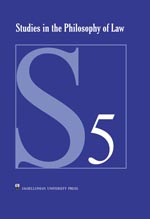The Question of Non Human Primates Morality
The Question of Non Human Primates Morality
Author(s): Mateusz StępieńSubject(s): Law, Constitution, Jurisprudence
Published by: Wydawnictwo Uniwersytetu Jagiellońskiego
Keywords: law; philosophy of law; law and biology; biojurisprudence; legal ethics;
Summary/Abstract: Walking in Darwin’s footsteps, numerous researchers have turned toward evolutionary theory for “the examination of a hypothesis concerning the factual matter of whether, and in what sense, and to what degree, human morality is the product of the process of biological natural selection.” The questions of morality have been partly taken over from the hands of philosophers and “biologized” as E.O. Wilson already recommended more than three decades ago. In spite of the fundamental disputes undertaken in general evolutionary theory, many specific empirical disciplines work on the adequate description and explication of particular morality-related issues. Neuroscience tries to map the “moral brain,” meanwhile by examining children in their earliest years, developmental psychology studies ontogenetic changes in the processes of moral reasoning and the emergence of the distinction between moral and other norms. Moral psychology studies universal cognitive and emotional psychological mechanisms related with morality (e.g. moral judgments, moral dilemmas) and “universal across cultures moral domains.” Recently, primatology has also contributed to the “biologizing of morality” enterprise, mainly by searching for and examining “proto-morality” or “the evolutionary building blocks of morality” in non human primates (hereafter termed NHP). The primatological studies are a part of the emerging literature on the “animal morality” question, but without a doubt research on NHP currently provides the most robust and well documented account of moral related phenomena in non human animals.
Journal: Studies in the Philosophy of Law
- Issue Year: 2010
- Issue No: 5
- Page Range: 135-153
- Page Count: 19
- Language: English

